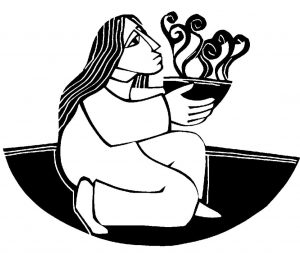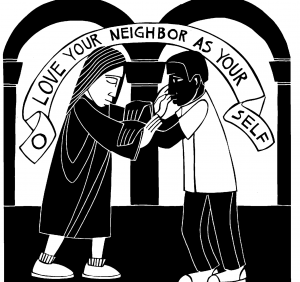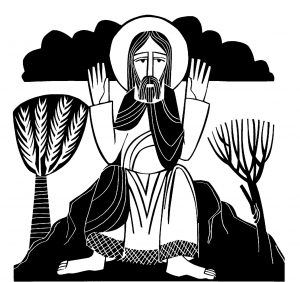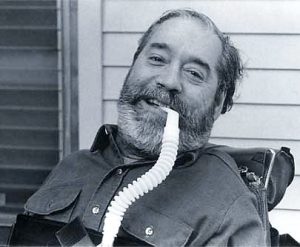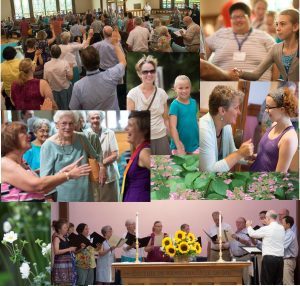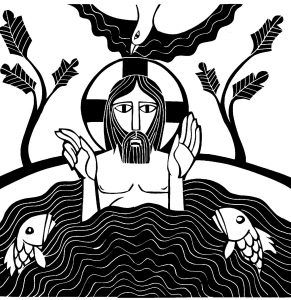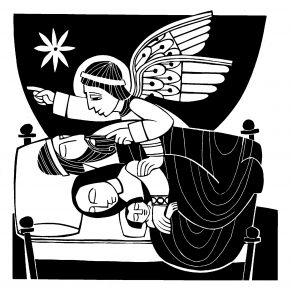This morning we remember the story of some of our ancestors: Father Abraham and Mother Sarah.
As with so many biblical stories, we know only the bare outlines of this one. We know who Abraham’s male forbearers were, going all the way back to Noah: you can read about them in Genesis Chapter 11. We don’t know what Sarah’s lineage is, or anything else about her, other than that she is married to Abraham, and has yet to produce any children. We know that Abraham’s father, Terah, settled in Ur, a place to the east of Canaan, in Babylonia. We know that Terah decided to travel from Ur towards Canaan with Abraham and with Sarah and with his grandson, Lot. Their journey takes them up north, to a place called Haran, and they stop to settle there. While they are in Haran, Terah dies at the age of 205.
Then God’s voice comes to Abraham, a new patriarch at 75, saying: “Go out from your country and your kindred and your father’s house to the land that I will show you. I will make of you a great nation, and I will bless you, and make your name great, so that you will be a blessing… in you all the families of the earth shall be blessed.” So Abraham goes, obedient to the voice of God; and Sarah and Lot go with him.
This is just the beginning of the biblical tale about this family. Abraham and Sarah and Lot travel west to Canaan and then south to Egypt and then back to Canaan again. Sarah is handed over to Pharaoh and Lot is kidnapped in a clash of local kings. An Egyptian servant named Hagar has a son named Ishmael with Abraham; Sarah has a son named Isaac with Abraham; Hagar and Ishmael are sent into the desert to die and then saved by an angel of God; Abraham goes up a mountain to sacrifice Isaac and an angel intervenes again. Isaac goes on to father Jacob and Esau, who have children of their own. These four verses of Genesis are just the beginning of a great biblical family saga. But let’s stay for now with just these four verses. We can learn so much from how a story begins. What can we learn from this beginning?
The Lord said to Abram, “Go out from your country and your kindred and your father’s house to the land that I will show you.” Those of us who are descended from Abraham are by nature immigrants. God calls us out of our present circumstances into something, or some place, new.
Abram’s call is not the first or the last example. The people of God have been so many places. We came up out of Egypt to the promised land; we sang songs while in exile in Babylonia; we persisted under Roman colonial rule. Looking beyond the biblical era, Jewish peoples and the Jewish faith have survived despite diaspora and discrimination and devastating violence. Meanwhile, Christians developed our communities by going underground into secret catacombs and later by sailing across the Atlantic in search of a more perfect expression of our faith.
The descendants of Abraham have always been immigrants. Perhaps it is our history of wandering that has made us so committed to hospitality. Moses relays God’s instructions that “The alien who resides with you shall be to you as the citizen among you; you shall love the alien as yourself, for you were aliens in the land of Egypt.” (Ex. 12, 22; Leviticus 19, 23, 24). Jesus tells those who follow him to welcome the stranger. And the Prophet Mohammad says, “Let the believer in God and the Day of Judgment honor his guest.”
We, the descendants of Abraham, are immigrants and wanders, strangers in strange lands and spiritual pilgrims. God calls us to let go of our attachment to our home, our family, and our nation, to belong ultimately to God alone. God calls us to be a part of something new that God is doing. God calls us to be faithful even in changing and challenging circumstances that have nothing to do with God’s will.
The Lord said to Abram, “Go out from your country and your kindred and your father’s house to the land that I will show you. I will make of you a great nation, and I will bless you.”
We, the children of Abraham, are immigrants. God calls us out of where we have been, of how we have been. And as we take the risk of following that call, God blesses us.
What does it mean to be blessed? As we know from watching Abraham and his family, to be blessed does not mean to have it easy. It does not mean perpetual happiness or even protection from hardship.
God’s blessing is harder to qualify. We receive it in moments of beauty and surprises of joy, in unexpected endurance towards the end of a long journey, in belly laughs in the midst of grief, in a hand to hold, and communities of faith to rely on. These are some of God’s blessings, which are abundant and yet too often hard to find, hard to recognize, hard to accept into our hearts.
We are immigrants, and along the difficult way of change and challenge God blesses us in strange and marvelous ways. God’s blessings are what make it possible for us to survive and even sometimes to thrive, no matter what circumstances we find ourselves in.
The Lord said to Abram, “Go out from your country and your kindred and your father’s house to the land that I will show you. I will make of you a great nation, and I will bless you, and make your name great, so that you will be a blessing… in you all the families of the earth shall be blessed.”
God calls us to new things, and gives us blessings along the way for a purpose. It is, in the end, so that we can be a blessing: a blessing to ourselves; a blessing to those we love; a blessing to all the families of the earth; a blessing to our Creator.
When I read this line, I think of the three great Abrahamic traditions, Judaism, Christianity, and Islam. In Jewish tradition Abraham is the founding father of the Jewish Covenant, the first faithful Jew. In Christianity, Abraham’s faith is lifted up by the Apostle Paul, who sees his trust in God as an example for all believers. In Islam, Abraham as both a patriarch and a prophet, a model of faith, a friend of Allah.
Think about all of the people around the world who are lifting up their prayers today to the God of Abraham, with many names: Allah, Ha-Shem, Adonai, Theos, Abba. We give glory to the God who calls us to belong to love first; and to share compassion with all other travelers through this world. When we are faithful to this call, we can between us bless just about every family on this earth.
Today is the second Sunday in Lent. Last week, we talked about loosening the soil of our hearts, to make room for what will happen next. I hope you are trying some prayers, some practices, to loosen things up. Last week we also prepared some pots of loose soil and planted tiny marigold seeds in them. Now, they are sprouting and reaching up here on our common table and in many of your homes.
When we consider how we are called to grow in this season, where will we find the seed, the start, the beginning? Perhaps we can find it in the beginning of Abraham’s story. Is God calling us to faithfulness in the midst of a new thing? Is God offering us a blessing we have yet to recognize or accept? Is God inviting us to be a blessing to others? Perhaps we can even use our blessings, and our privileges, to be a blessing to those other children of Abraham who are facing defamation, and deportation, and bomb threats, and desecration of burial grounds, in this nation that claims so often to be Christian.
Let us count our blessings. We are children of Abraham and Sarah, part of an ancient lineage of faith. We are children of God, and we belong first and foremost to love. We are blessed, not to set us apart from others, but to bind us closer to them: to be a blessing to every family in the world. May it be so. Thanks be to God.
